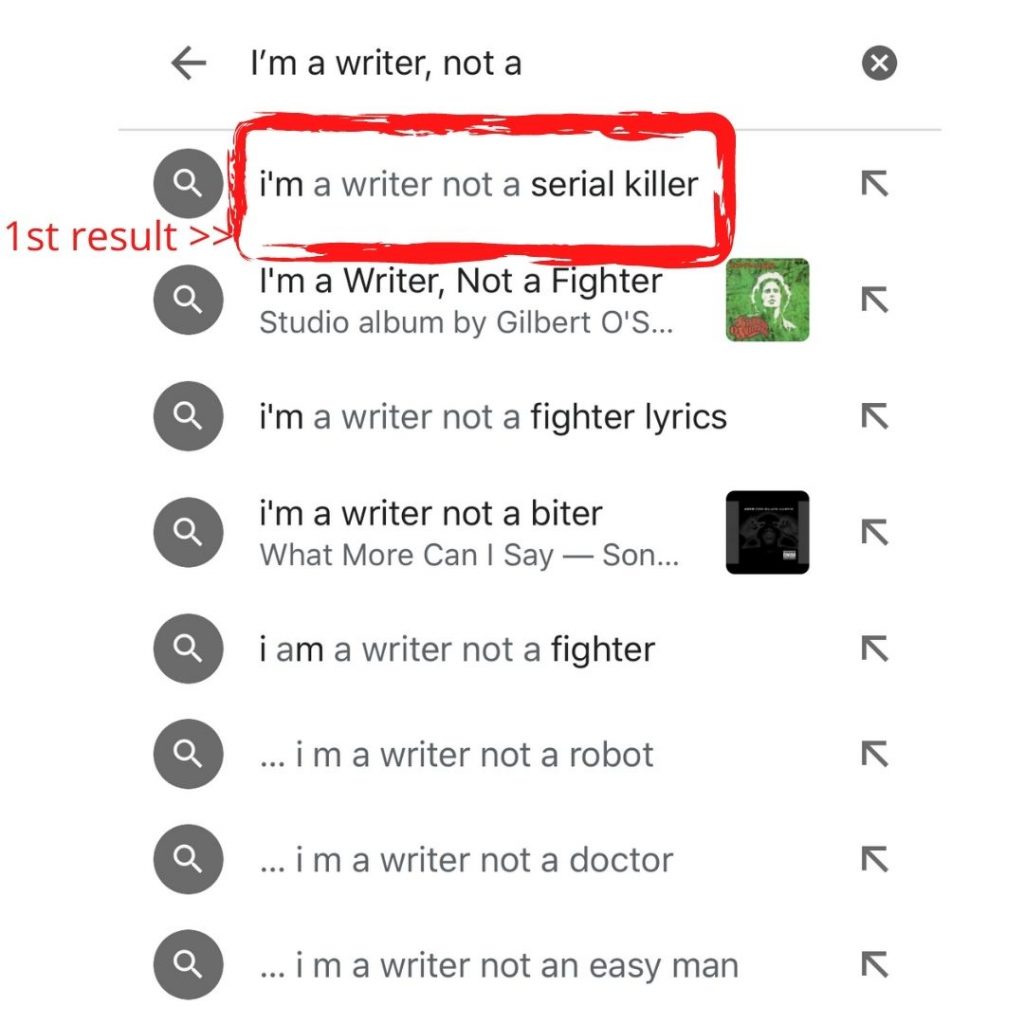
Do you know a writer? What about someone who wants to be a writer? If this bit of a downer article by the New York Times is any indication, you do, with over 85% of people saying they want to write a novel someday.
But, and I make this point gently, there is a difference between writers and people who wish to write. It takes a transformation that leaves a person different than they were before. And sometimes, that new person may leave you scratching your head.
Think about it as an astronaut. How many people want to visit the stars? How many take the steps to do so? It takes dedication, devotion, and daring to be a writer, and that’s important to recognize.
The distinctions between a writer and an author make no difference for the points in this article, however. Suffice yourself with knowing that all authors are writers and that no amount of success chases away the skeletons in a writer’s closet.
With that in mind, this article is about what you need to know if you love a writer and if I do my job right, why it matters.
Now that we’re all set with the minutia, let me tell you a (not-so-secret) secret.

Writers Are Sensitive.
I don’t care if the person you love writes romance novelettes, a cookbook, or horror novels that put Steven King to shame. They’re sensitive.
I believe this ties back to the old saying that words have power. Giving voice to thoughts — making the whispers of our minds visible to everyone, including ourselves, can be intimidating.
No. Not can be. Definitely is.
And this doesn’t change after we have published our first novel, or our tenth, or our hundredth. Because confidence is different than sensitivity.
To put it another way, when I first entered the writing world, the loving group I joined joked about how all writers have calloused souls.

How right they were and still are. Because they’re all still writing, rubbing the skin of their hearts raw against the rough sides of editors and slushpiles, of critiques and rejections.
And for sure, with time and publications and years of slashing work to try and make it something others want to read, we do develop a thick skin. But that thick skin forms to protect the gooey underlayer of sensitivity.
With that in mind, here are the 9 things you should know if you love a writer and want to treat their soft underbellies with care.
1. If you love a writer, know that imposter syndrome is real.
For those of you who are unfamiliar with the term, imposter syndrome is when someone — in this case, writers — feel like they are unequivocally mismatched for the task, or even undeserving.

This takes form in different ways, though the core is always the same. For instance, maybe the writer you love has just found the gumption and poetry within themselves to start writing and are new to it all. They might express sentiments like these:
- I can’t write a book, what was I thinking?
- I don’t have time for this.
- I don’t know what I’m doing!
- I’ll never get published, so what’s the point?
- I don’t even have an English degree!
- I just read the most amazing book, there’s no way I could do that!
- I can’t write a book, I’m just a _______ (insert any normal, perfectly fine things to be along with a writer but which feel like the poison of ineptitude by writers: mom, teacher, accountant, student, burger flipper, horse jockey, etc).
This isn’t just plain ol’ pessimism or skepticism, it’s a heart-crushing and very real feeling all writers struggle with. Just check out this 2019 study on the prevalence of imposter syndrome. In it, they note that “People with impostor syndrome struggle with accurately attributing their performance to their actual competence.”
In other words, they could be the most fantastic writer to have walked the earth (take that Thoreau and Shakespeare, Charles Dickens and J.K. Rowling), but still feel like their work is garbage.
It is a hard feeling to overcome and some writers never do, even after they’re published and successful.
So what can you do to help fight imposter syndrome?
For starters, make sure not to roll your eyes. Offer support. Show love. Encourage them to keep at it even if they feel low. And remind them to be empathetic and loving towards themselves. All writers go through this. They’re not alone. And that they don’t have to be the next ultra author to write things that matter to people.
2. If you love a writer, don’t psychoanalyze their work.
Really, though.
Like… really.
I can’t tell you how many lovely writers I know who have written amazing things and never pushed them into the light because they were worried about what other people would think of them.

Are people going to judge the soul of a writer by their work? Absolutely.
But you don’t need to be one of them.
Just because the writer you love writes horror doesn’t make them secretly a serial killer. (I’ve heard it.)
And if they write a romantic lead who might be sort of, kind of, despicable a little doesn’t mean that’s what they want in a romantic partner or that they’ll be that way to those they love.
Sometimes, this also means that your beloved writer has some REALLY weird google search history. Again, this doesn’t mean they plan to blow up Times Square or have a fetish with the musculature of feet. It means they have a character or plot point that needs them to be an expert.

Because in the end, writers are cataloging histories, exploring and sharing worlds, and writing stories. And we’re taught in the fiction-writing community (and by our readers) to torture our characters mercilessly and make them suffer as much as possible.
And guess what? That means we’re not going to all write lovely, fluffy stories where only good things happen. Because most people have no interest in reading that. There would be nothing to relate to.
Real life is hard, so book lives should be, too. It doesn’t mean the writer you love has a dark and sordid past, was tortured themselves, loves gore, or has psychological issues. It means they’re an amazing storyteller who can embody the experiences of others and share them.
That’s empathy. That’s awesome. And it’s not worth psychoanalyzing. So, you know… don’t.
3. If you love a writer, give them the space they need to feel other people’s emotions.
On that last note, know that writers feel. A LOT. And why wouldn’t we? We are creating and destroying the lives of someone we are coming to learn and know intimately.
What does this mean for those who find themselves loving a writer?
It means you may walk in on them sobbing their eyes out for torture they inflicted on their own character. Yes. That happens.
Or feeling giddy and bubbly because they wrote an adorable little love scene.

Or if the writer you love is a non-fiction writer, maybe they’re feeling a bit misanthropic for a while because war sucks or are feeling down because nature can be cruel.
The most important thing you can do for your writer in this regard is let them feel the feels. Let them drop tears onto their keyboard or do a silly dance in the living room. Let them bemoan the harsh reality of living on the earth, or feel squeamish at the thought of people who do need to be psychoanalyzed.
And perhaps even more importantly, don’t internalize their emotions as something you did. It won’t be helpful to you or them. Instead, offer them comfort even if you don’t understand why she’s sobbing since she was the one who chose to have little Freddie die in the first place.
4. If you love a writer, encourage them to read.

A Lot. It’s the same thing as encouraging an Olympic athlete to keep training. To exercise. To stay in shape. Reading is one of the best ways for a writer to flex their creative and technical muscles.
It also can bring them enjoyment and relaxation. A win-win. So next time your writer seems to feel a little stuck or overwhelmed, encourage them to take some time to curl up with a good book. You’ll be doing both of you a favor!
5. If you love a writer, understand that getting published takes a LONG time.
It just does.
J.K. Rowling took seven years from having the idea of Harry Potter to getting an agent. This means it wasn’t even published in that time frame, she still had work to go!
I’ve heard the well-intentioned but soul-crushing question a thousand times myself (allowing for some slight hyperbole):
Are you published yet?
Er…
Usually, people are asking how your progress is going and have assumed, erroneously, that writing a book is similar to doing your taxes yourself. You gather materials, hammer it out, feel a little anxious about whether you did it right, then send it off and get the check in the mail, or you don’t get a check and have tears in its place.
Not so, my friend. Not so.

So much goes into writing a book. A writer has to dream a concept, if it’s fiction they have to build a world, do research for non-fiction and books with historical settings, write the darn thing, re-write the double darn thing because it didn’t turn out, fight with characters, fight with imposter syndrome, find beta readers, get them to actually respond, re-write, rinse and repeat, make a query, send it out, have their soul crushed, do this over and over until the grapes of their soul resemble jam, and then juice, and then hopefully, maybe, get a publisher or agent in a jam-packed market.
So if you ask a writer if they’re published — and let’s be honest, if you love this writer, you probably would have heard from them if they had — know that you’re jamming a metaphorical stake into their heart.
If you don’t want your beloved writer bleeding juice, try one of these questions instead:
- Are you making good progress on your (novel, cookbook, memoir, journaling, etc)?
- Write any awesome (scenes, recipes, memories, etc) down lately?
- Have you been finding enough time to write, lately? (Might be good to follow with an “I know that’s probably tough!)
- Tell me about what you’re working on lately!
All of these questions (and one emphatic command) will bring joy to your writer instead of crushing them to a pulp. And if they’re getting published, they’ll tell you happily in response to any of these. And probably without any prompting at all.
6. If you love a writer, don’t call writing a hobby.
Even if your writer calls it that themselves.
Just don’t do it.
(See Thing to Know if You Love a Writer #1 as the basis for what I’m about to say.)
A great majority of writers want their work to be seen. Whether by a small group of immediate family or by masses of adoring fans, it makes no difference. They want to be published.
And even if they don’t (or say they don’t), they still pour their heart and soul into it. And while there is nothing wrong with hobbies in general, and many a woodworker or skier or scuba diver would be glad to claim that label, writers aren’t one of those. Neither, for the most part, are serious musicians — but I digress.

Writing is a very personal, very vulnerable form of art that exposes that heart you love so much in your writer. Don’t beat it with a piñata stick.
Carolyn Hoffert
Instead, try calling it their passion. Their labor of love. My husband often refers to it as my other lover. And while he’s a cheeky man and I always swat his arm and say whatever, it fills me up. Because he knows writing is close to my heart and that it takes up a lot of time and thought. So if none of these suggestions work for you, that’s fine. Come up with your own term. The more endearing and personal, the better.
7. If you love a writer, read their work and give feedback.
I cannot stress this point enough, so let me say it again — in all caps, of course, for in-your-face emphasis:
IF YOU LOVE A WRITER, READ THEIR WORK AND GIVE FEEDBACK!
Carolyn Hoffert
Now that we got that bit of overzealousness out of the way, let me tell you the two reasons why:
- Because writers write things so they will be read. It is literally the very purpose of what they do.
- Because writers can’t improve without feedback.
Now, before I continue, let me add a caveat. If you hate to read, as in you’d rather swallow a cactus or shove a habanero pepper in your eye than read anything, then maybe just don’t. You can substitute this with listening actively to your writer tell you about their plot problems, helping them brainstorm better ideas, answering their super weird, non-sequitur questions, and generally supporting them.
If you don’t have this tragic aversion, then these two steps will go a long way in helping your writer feel loved. I can’t tell you how many fabulous writers I know who say their mother hasn’t even read their book. Ouch, right? And some of them are published, too. And unless they’re writing the next Grapes of Wrath or Anna Karenina, there’s really no excuse.
Good news: audiobooks count!
Examples of helpful feedback:
When you are ready to support the writer you love by commenting on their work, aim for helpful feedback. I know this can be scary. A lot of writer lovers are worried that if they give negative feedback it will crush their writer’s soul and hurt their feelings. While it might… it will also help them grow, and if they’re asking for your feedback, it usually means they legitimately want it.

Because if it’s not helpful (or emphatically praiseworthy… because who doesn’t want that?) then you might as well not have said anything. For instance, a family member did read my work once (thanks!), but then left me with only one super-duper helpful line of feedback:
You kill a lot of people and no one kisses.
Oh…
Needless to say, I was much more hesitant to share my work with that person in the future. So what are some bits of helpful feedback?
- Anywhere you may have been confused in the book.
- Any plot holes you spotted.
- Any places where the pace drags a bit.
- Any time you didn’t understand the character’s motivation.
- And any scene where you wanted more!
Giving constructive, helpful feedback will not only support the writer in your life, it will also score you big points!
8. If you love a writer, keep your criticism off the internet.
While I feel like this one is obvious, I have seen good writers agonize over bad reviews… from people they care about! People who could have told them to their faces.
Now, I know in this age of social media and digital everything that typing our thoughts down and sending them off to space and back feels a bit safer. I mean, of course, it does. But for writers, it can be a death sentence.
Reviews are a published author’s bread and butter. Especially the first hundred or so to find their way into the forever catacombs of the internet. So if you love a writer and feel the need to espouse their literary failings, PLEASE get up the gumption to say it to their face. And do it nicely. There’s a difference between helpful feedback (see above), and giving their book the shaft. I promise you it will hurt them less than leaving your critique up where they and everyone else can read it day after day after day…
That said, if you loved their book, please DO leave a review!! Seriously. It will mean the world to your author, help build their credibility, and reflect on you as a fine connoisseur of literary digestibles.
9. And finally, if you love a writer, know that writing is not a solitary endeavor.
If you haven’t garnered this point from what I’ve already written, I made sure to make it it’s own bullet point. 🙂
Writers need support, encouragement, beta readers, paying readers, wonderful reviewers, and people who won’t diminish the love they have poured into their work.
In that light, I highly encourage you to help the writer you love find a community of other intrepid wordsmiths. Help them find local writing conferences to go. Suss out a critique group or encourage them to start one for themselves.
And in the end, make sure you’re there for them, too.
They will thank you for it. And who knows… maybe even put you in one of their books.


